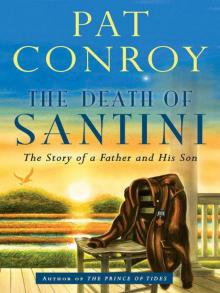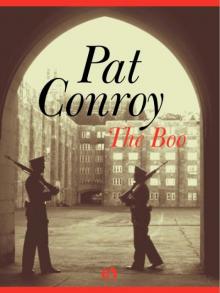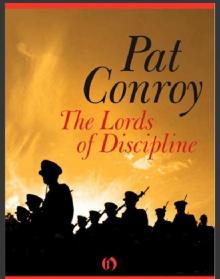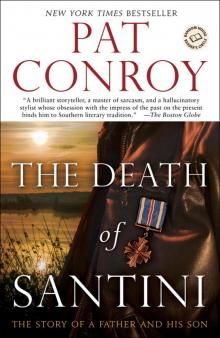- Home
- Pat Conroy
The Boo Page 2
The Boo Read online
Page 2
Memory differs from experience. Memory softens the features of upperclassmen’s faces that once seemed to emanate a sinister and all-corrosive evil. I forget much of the cruelty of that year, but remember most of those deliriously happy moments when the freshmen would gain small and insignificant victories over their tormentors. Memory is a kinder mistress than experience. On this day at the beach, I remember only one face and one sound. I know I complained to a hundred freshmen that day, but I remember none of them. The one indelible image I carry from that day is of a gray-haired, cigar-smoking, Lieutenant Colonel in the Army with a voice like a noon whistle. In a single moment of time, he imprinted his face and voice in the minds of every freshman on the beach. This was The Boo.
The Boo. Because of that initial introduction, I did not speak to him for over a year. The power and volume of his voice were unlike anything I had ever heard. I learned that day The Boo was an institution around The Citadel, that he was extremely well-liked by cadets, and that he was their most trusted friend on campus. Good guy or not, his voice could freeze souls traveling to purgatory, and I was not going to cross his path if I could help it.
Six full years have passed since that day. These years have brought remarkable changes in my perspective toward life and people. This book will reflect some of the changes. I have always thought that anyone who writes a book about The Citadel is treading on dangerous ground. She is a world apart. She is so different and so unique in a thousand ways. The Citadel has her quirks and eccentricities like all colleges, but hers seem to be odder than most and much more difficult to justify or explain. And what is humorous at The Citadel is often mere immaturity in civilian institutions. Incidents which find cadets slapping their knees and helplessly convulsed in laughter would not merit a courteous chuckle anywhere else. Even a language barrier separates The Citadel from the outside world. Knob, plebe, and dumbhead are terms which might be familiar to some civilians, but shako, press, ERW, and pop-off might as well be written in Sanskrit. Yet I want to write this book. The story of The Boo is one that should be told. It should be told now before the legend crumbles and disappears from the earth.
The Boo is a special person. This book will prove that. Like the sterotype of the grizzled sergeant whose bark was worse than his proverbial bite, The Boo spent much of his life barking. He ranted and hollered at a generation of cadets, but could never quite conceal the vast and compassionate human spirit that pulsed beneath the surface. He was not perfect. In the performance of his duties as an Assistant Commandant, he could be a roaring bastard. In his performance of duty, he sometimes seemed too eager to pin the cadet to the wall. He had his warts and flaws. No doubt, some cadets hated his guts and will carry this hatred to their graves. But I do not give a damn about these cadets, just as I don’t give a damn about The Boo’s flaws. Neither do the cadets he helped, nor the cadets who looked to him as a father-figure away from home. And all cadets looked to him for bright moments in a sometimes gray and meaningless existence.
The Boo played a significant part in my development at The Citadel. He granted favors for which I am still thankful. I think he recognized the renegade spirit which raged within me and realized my frustration in an atmosphere, I believed, stifled me. In my four years at The Citadel he was the single most important force on campus and exerted a tremendous influence on all the cadets he loved and served. General Clark walked the campus like a retired deity and ignored the general run of cadets. General Harris had the warmth of an Amana freezer and never was quite able to achieve the common touch. So it was toward The Boo we turned. All of us. We looked to him for laughter and for compassion. We loved him for what he was and for what he wanted us to be.
This will be a book of praise, casual reminiscing, and moments remembered. I write of a man, his school and the boys around him. Thomas Nugent Courvoisie, Lieutenant Colonel, United States Army, Retired. He served as Assistant Commandant of Cadets at The Citadel from 1961 to 1968. Legends have sprung up about him. I will record both the legend and the fact, or as they say, the man and the myth. The book will be very personal, for I am personally involved. I like the man. But many of the stories happened years ago. Many of the stories that should have been told have been forgotten. Here is a portrait of a man and his school sketched by one who remembers, by one who cannot forget.
THE SCHOOL
The Citadel, to borrow from Porgy and Bess, is a sometime thing. Sometimes it seems to be relevant to what is happening in the twentieth century. Other times, it seems like a hopeless anachronism, thrusting its stone hulk into an age that is passing it by. Sometimes the cadet will wonder if he has found a substitute womb—warm, nourishing, and protective—or whether he has simply entered a chaotic world rimmed by four walls that is all rush and disorder. Sometimes The Citadel seems like a world populated by lunatics over which the cadet, as an individual has no control. Many contradictions hide behind the gates.
One thing is certain: The Citadel is like no other school. It is a proud and dedicated factory of soldiers; a college which stresses patriotism over every other virtue; an eccentric leftover from the Old South when the gentlemen of the manor departed from home to be hardened under military regimen. The Citadel is part of the South and southern tradition. She proclaims with unconcealed pride the role played by her sons in the Civil War. Southern mothers who send their sons to The Citadel believe with absolute conviction that their country offers no finer education. Not only are young men exposed to vigorous academic routine, but they are also required to live by a strict system of absolute regimentation. While other colleges around the nation reverberate from the shock waves of student militancy, The Citadel drifts placidly along, in perfect control of a student body more concerned with the workings of an M-14 rifle than the problems of social consciousness. The Confederate Flag is her indelible symbol. Rockets, jets, and tanks decorate her campus. A war eagle sits atop her main academic building. Her professors dress in the uniform of the South Carolina Militia, a military organization as defunct as Hannibal’s Legions. Her president is always a four star Army General who retired with glorious accolades and a scrapbook of press clippings. The scene is military with all the pomp and circumstance which that term implies. The Citadel cherishes the belief that the more hardship endured by the young men, the higher the quality of the person who graduates from the system. The Citadel devised a formula years ago to improve the quality of men who walked through her gates.
The formula begins with the plebe system. One thing is certain. The plebe system is calculated to be, and generally succeeds in being, a nine month journey through hell. The freshman is beaten, harassed, ridiculed, and humiliated by upperclassmen who concur and believe in the traditions of the school. Under the pressure of this system, the freshman, in theory, becomes hardened to the savage hardships of the world. Life is tough, the system says, and we are going to make life so tough for you this year that when your marriage dissolves, your child dies unexpectedly, or your platoon is decimated in a surprise attack, you can never say The Citadel didn’t prepare you for the worst in life. So when the plebe walks into second battalion on the first day of school, he enters a world so unbalanced and precarious, it takes him the next three years to recover his equilibrium. The freshman is a germ, an amoeba, the lowest form of life. He deserves no consideration for his human qualities, and he gets none. He finds himself called a litany of names and semi-curses: knob, screw, wad, waste, dumbhead, abortion, nut, and many others. He is starved at breakfast, tantalized at lunch, and ignored at supper. He does pushups till his arms are heavy as iron; he runs up steps till his thighs grow useless. He has no freedom, no privacy, and no time to study. He cries at night, writes piteous letters to his parents, and bemoans the day he ever wrote to The Citadel. For nine months he marches, braces, and hustles in misery. But at the end of nine months a miracle as strange as birth takes place. The cadet looks in the mirror and in a moment of supreme madness, decides he loves the place.
To the uninitiated, this
particular form of behavior borders on the ridiculous or the sublime. It is in this realm and with these cadets that The Boo became a kind of landmark at The Citadel. His was the world of discipline. For it is here that his shadow, looming in the dark corners of the barracks, created a dream kingdom of his own. In his job as an Assistant Commandant of Cadets, he was in charge of meting out punishment for various infractions, both large and small, that the cadets would commit during the year. The job was a combination of many things. The Boo could be described as part father, part confessor, part inquisitor, part detective, part judge, and part son of a bitch. If you barfed on the president’s wife or raped a Charleston debutante, you would face The Boo on his territory and under his terms. He represented law and The Blue Book, the constituted force of authority, and the power that reigned above the heads of the cadets. But if he ruled, he ruled with compassion and humor. He laughed like hell when he caught some hapless cadet in a prank, but his gift resided in his ability to make the cadet laugh with him. Boo was the representative of justice at The Citadel. The Boo versus the cadets. These two antagonists waged furious battles trying to outsmart each other. Cadets claimed countless victories, but the number of figures pacing the quadrangle of Padgett-Thomas Barracks indicated The Boo was not without his brighter moments. Parry and thrust, withdraw and retreat, the cadets never tired of challenging the system. Each side respected the intelligence and creativity of the other. Cadets, like prisoners, used every resource to circumvent rules or to scuff their shoes on the pages of The Blue Book.
This is the stuff of this book: Cadets behind the stone and steel yearning to breathe free, The Boo, grand wizard of discipline who held the great screw in his hand, and the warm, human relationship that formed between them.
A MATTER OF NOMENCLATURE
The mother of T. N. Courvoisie, no matter what her thoughts at the moment of his birth, did not name her son Boo. The nickname has made a long journey through several phases, finally arriving intact in its present condition. Some mythical cadet years ago, and forgotten by even The Boo himself, claimed that he skipped campus one night to go to Charleston. On returning, so the legend goes, The Boo spotted him slipping behind the baseball field. Ignoring the order to halt, he claims he was pursued through the marsh and swamp that rim the Ashley River boundary of The Citadel. Looking back at the hapless Army Colonel sloshing through the mud, the cadet later remarked that he looked like a “trapped caribou.” Caribou stuck. Tongue laziness and the Anglo-Saxon affinity for shortening words of more than one syllable soon diminished the word to “BOU,” and finally to the non sequitor Boo. Since few people residing in the free world today can even pronounce Courvoisie, the name proved beneficial in many respects.
BOO-LANGUAGE
Boo referred to the cadets as his “Lambs.” This shepherd-to-flock analogy pleased the cadets immensely. If you were asking the Colonel for permission to go on a weekend leave, he would usually ask, “What’s your problem, Lamb?” and the security of being called that particular animal by The Boo was a feeling hard to describe to outsiders. “Lamb” was not a term of derision. On the contrary, it represented Boo’s concern for all cadets and their problems. Whether the cadet in front of him was a fourth class private or the Regimental Commander, he was still a lamb to The Boo and lambs possessed no rank. When one cadet asked The Boo why he referred to cadets as his lambs, The Boo replied, “Because I am the good shepherd.”
The word “Lamb” lacks, however, force and emphasis and when Boo wished to be forceful or emphatic, which he did quite frequently, he would use the word “Bum.” I only wish that I could attach a tape recorder to this book, one that contained a suitable soundtrack of Boo Roars and Boo Growls and Boo Grunts. When the Colonel said, “Boy, you are a Bum,” “Bum” sounded like a peal of thunder bouncing off a distant Alp. It was a loud, slow, rolling sound that crashed from his tongue to your ear like the giant from Grimms Fairy Tale who bellows “Fe-Fi-Fo-Fum, I smell the blood of an Englishman.” Well, the Fum in that line, spoken by huge vocal chords, approaches the range, pitch, volume and intonation of the Boo’s rendition of a “Bum.”
His voice is important to this story. Its power cannot be underestimated. Bob Marks and I were walking toward Jenkins Hall one morning in our junior year when The Boo let one rip from the steps of Bond Hall. The distance from the two points separating us measured a little over a quarter of a mile. The howl, “Hey you,” swept across the parade ground freezing every living creature in its tracks. My roommate instinctively asked, “Is he yelling at us?” On this occasion, the poor lamb who merited Boo’s attention was a trifling fifty feet away from the power source. No small voice had he.
A third word to add to your Boo-vocabulary is “Bubba.” “Bubba” lacked the warmth and sense of dependency enjoyed by “Lamb,” yet it did not have the abrasive quality which surrounded the word “Bum.” “Bubba,” then, occupied a kind of twilight zone in Boo-language. If Boo used the word “Lamb,” chances were benevolence pervaded his mood; if he countered with the word “Bum,” the cadet usually could feel the presence of the sword poised over his head; if he merely used “Bubba,” a certain equilibrium and feeling of all’s-right-with-the-world would descend gently on the cadet. Every young man at The Citadel became a gifted interpreter of Boo-language, a feeler of mood pulses which registered danger or safety in the high-strung world of the Corps of Cadets.
Cadets are people. Behind the gray suits, beneath the Pom-pom and Shako and above the miraculously polished shoes, blood flows through veins and arteries, hearts thump in a regular pattern, stomachs digest food, and kidneys collect waste. Each cadet is unique, a functioning unit of his own, a distinct and separate integer from anyone else. Part of the irony of military schools stems from the fact that everyone in these schools is expected to act precisely the same way, register the same feelings, and respond in the same prescribed manner. The school erects a rigid structure of rules from which there can be no deviation. The path has already been carved through the forest and all the student must do is follow it, glancing neither to the right nor left, and making goddamn sure that he participates in no exploration into the unchartered territory around him.
A flaw exists in this system. If every person is, indeed, different from every other person, then he will respond to rules, regulations, people, situations, orders, commands, and entreaties in a way entirely depending on his own individual experiences. The cadet who is spawned in a family that stresses discipline will probably have less difficulty in adjusting than the one who comes from a broken home, or whose father is an alcoholic, or whose home is shattered by cruel arguments between the parents. Yet no rule encompasses enough flexibility to offer a break to a boy who is the product of one of these homes.
The Boo recognized that not all cadets came from atmospheres which would presage immediate success in the regimented universe of The Citadel. Each day as he sat in his office, chewing great brown cigars and performing the administrative tasks his job demanded, a constant stream of cadets armed with pathetic, soap-opera stories about some real or imagined domestic problem begged and pleaded for favors which only The Boo could (or would) grant. Many of these stories were concocted solely because the cadet wished to leave campus on the weekend. He might want to go home to escape the pressures of the military system, or his girl friend might be coming down I-26 to spend the weekend in Charleston. Whatever the reason, The Boo’s office was the only place on campus where immediate gratification of the cadet’s wishes could be achieved.
Some of the finest acting in Charleston has not been performed at the Dock Street Theater but in The Boo’s office on Friday afternoon. The wringing of hands, the piteous eyes, the voice cracking under pressure, the fevered brow: these were the histrionic weapons of men in gray uniforms confined within the gates of The Citadel, yearning to breathe free. I once heard a cadet tell The Boo that he had impregnated two girls, both of whom were demanding his hand in marriage. Needless to say, he needed an immediate pass to go to h
is hometown to remedy the seemingly hopeless situation. The Boo, writing at his desk, without looking up, and with magnificent nonchalance said, “Bubba, you have to do better than that. Why do you really want a pass?” “Colonel, this girl is coming down. She’s beautiful, gorgeous. I’ve got ten confinements.” He got the weekend leave.
Over the years The Boo became the master of sifting through the smoke screens and shoveling through the piles of verbal manure the cadets would use as diversionary ploys. If you were going to fool him, your story would have to be airtight. Your acting ability would have to be superb, able to withstand the most withering cross examination, and able to convince the cigar chomping director that there was merit and truth in the gentle lies you were concocting. The more fantastic the story, the more The Boo responded, the more he laughed and needled you. Boys would come to his office and swear their mothers had been raped, their fathers decapitated, their brothers and sisters charred in a fire and never give a clue by their outward demeanor whether their stories were true or merely macabre testings of their imaginations. The cadets were not lying. This is very important. These wild improbable stories were part of a larger structure called “The Game.” “The Game” takes place between Colonel Courvoisie and his “Lambs.” If the lamb was creative, originated plots and story-lines that involved death, pregnancy, incest, or any other of an infinite number of possible situations, then chances were good that The Boo would grant him a favor. Often he would grant favors for no other reason than the cadet’s inventiveness. Mediocrity was the unforgivable sin.

 A Lowcountry Heart: Reflections on a Writing Life
A Lowcountry Heart: Reflections on a Writing Life The Death of Santini: The Story of a Father and His Son
The Death of Santini: The Story of a Father and His Son The Boo
The Boo The Prince of Tides
The Prince of Tides Beach Music
Beach Music The Water Is Wide
The Water Is Wide My Losing Season
My Losing Season The Lords of Discipline
The Lords of Discipline Pat Conroy Cookbook
Pat Conroy Cookbook My Reading Life
My Reading Life My Exaggerated Life
My Exaggerated Life The Pat Conroy Cookbook
The Pat Conroy Cookbook A Lowcountry Heart
A Lowcountry Heart The Death of Santini
The Death of Santini